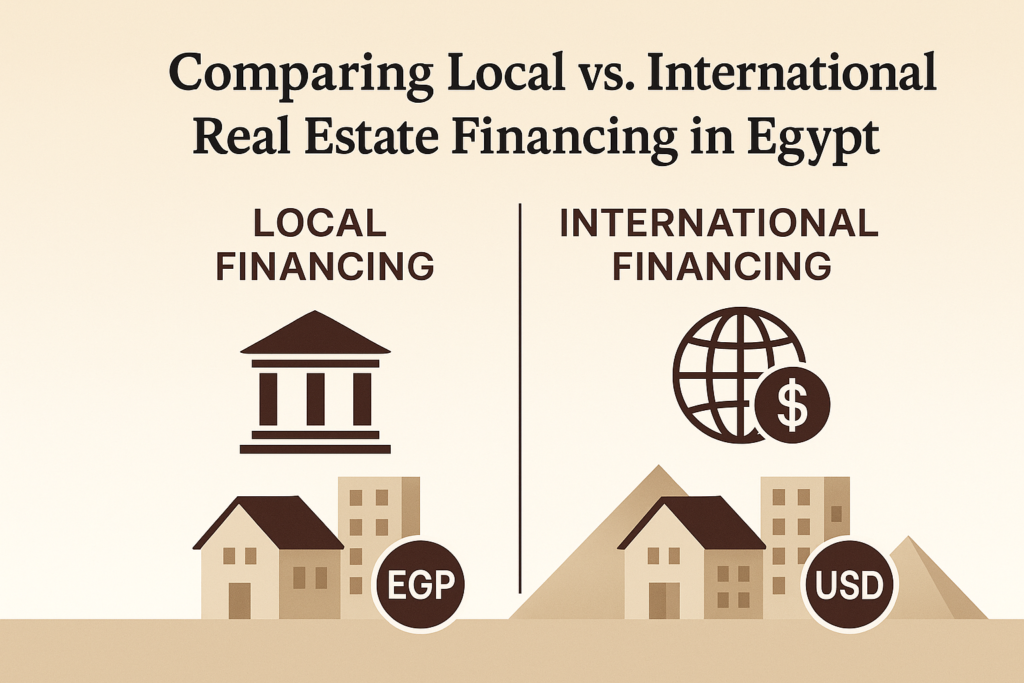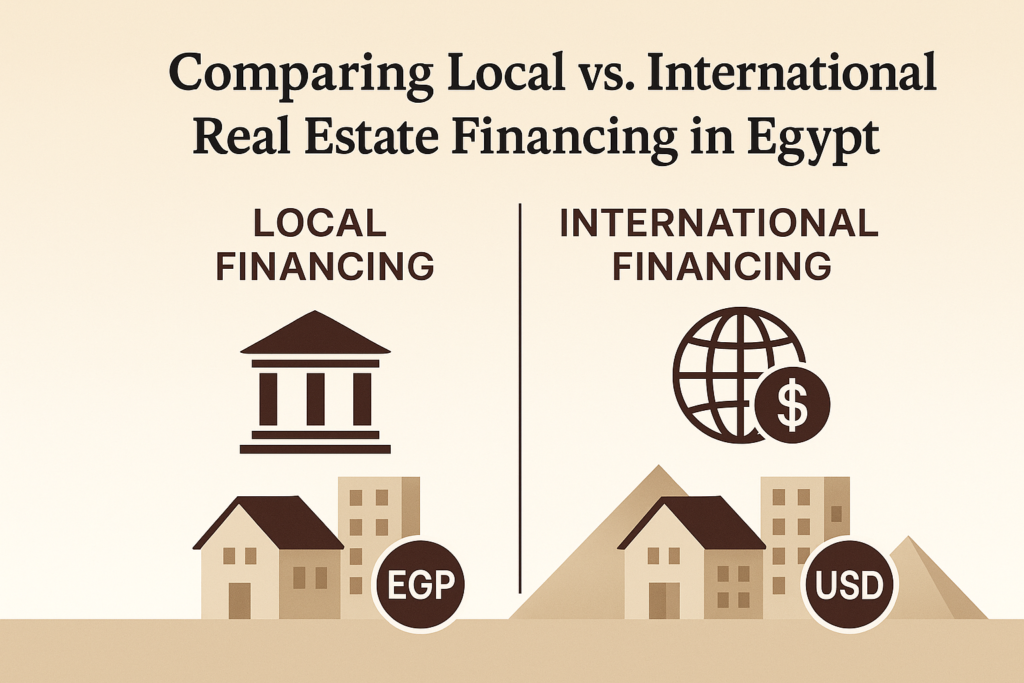المقارنة بين التمويل العقاري المحلي والدولي في مصر: أيهما الأفضل لمستثمر العقارات؟

مقدمة: التمويل العقاري اختيارك الامثل و مفتاح دخول عالم الاستثمار العقاري مع ارتفاع أسعار الفائده العقارات في مصر وتوسّع الخيارات أمام المستثمرين المحليين والأجانب، أصبح التمويل العقاري أحد العناصر الأساسية في معادلة اتخاذ القرار. البعض يعتمد على التمويل البنكي المحلي، بينما يتجه آخرون إلى مصادر تمويل دولية أو خارجية. لكن ما الفارق الحقيقي بين الخيارين؟ وما الذي يناسب استثمارك العقاري في مصر؟ في هذا المقال، نُجري مقارنة شاملة بين التمويل العقاري المحلي والدولي، من حيث الشروط، الفوائد، الأمان، والارتباط بخدمات Consult التي تدعم المستثمر في اختيار أفضل خيار تمويلي. أولاً: ما هو التمويل العقاري المحلي؟ تعريف التمويل المحلي ومزاياه التمويل العقاري المحلي يُقدَّم من قبل البنوك المصرية أو شركات التمويل داخل مصر، ويشمل: شراء وحدة سكنية أو تجارية داخل مصر تمويل جزء من ثمن العقار (يصل حتى 85%) أقساط على مدى زمني يصل إلى 20 سنة أسعار فائدة مرتبطة بالمعدل المحلي (قد تكون ثابتة أو متغيرة) المزايا: سهل التقديم للمقيمين داخل مصر التعامل مع جهات معروفة وقانونية التزام واضح من المطورين بالتسليم في حالة التمويل إمكانية دمج التمويل مع مبادرات الحكومة مثل مبادرة التمويل العقاري لمتوسطي وفوق متوسطي الدخل العيوب: إجراءات طويلة نسبيًا دخل ثابت مطلوب بحد أدنى قيود على نوع العقار أو حالته ثانيًا: ما هو التمويل العقاري الدولي؟ تعريف التمويل الخارجي ومتى يُستخدم التمويل العقاري الدولي يشير إلى اعتماد المستثمر على مصدر تمويل من خارج مصر، مثل: قروض عقارية من بنوك أجنبية قروض شخصية بتحويل بنكي لشراء عقارات في مصر استخدام أرباح استثمارات أجنبية لإعادة استثمارها داخل مصر المزايا: مرونة أكبر في شروط السداد عدم الحاجة إلى إثبات دخل محلي متاح للمستثمر الأجنبي غير المقيم إمكانية الاستفادة من سعر صرف الدولار مقابل الجنيه العيوب: تعقيدات في التحويلات المالية بسبب قوانين النقد الأجنبي مخاطر تتعلق بتقلبات سعر الصرف صعوبة تسجيل العقار باسم ممول أجنبي بدون تمثيل قانوني مقارنة مباشرة بين التمويل المحلي والدولي المعيار التمويل المحلي التمويل الدولي جهة التمويل بنك أو شركة تمويل مصرية بنك خارجي أو جهة دولية الفئة المستهدفة المصريون المقيمون الأجانب والمصريين المقيمون بالخارج العملة الجنيه المصري الدولار أو اليورو التقييم العقاري إلزامي من البنك مرونة أكبر الضمانات دخل ثابت، شهادة راتب، تحويل بنكي حسابات خارجية، أصول إضافية الربط بالسوق المحلي مرتفع منخفض (معزول عن البيئة المصرية) الإجراءات القانونية واضحة ومباشرة معقدة نسبيًا وتتطلب استشارة قانونية كيف تساعدك Consult في اختيار التمويل الأفضل؟ دور استشارات Consult في توجيهك إلى الحل الأمثل تحليل جدوى التمويل يقوم فريق الاستشارات المالية في Consult بتحليل قدرتك التمويلية وربطها بالعقار الأنسب، سواء عبر تمويل محلي أو دولي. تنسيق مع بنوك وشركاء تمويليين لدى Consult شبكة علاقات مع بنوك داخل وخارج مصر لتسهيل إجراءات القروض العقارية بشروط مرنة. استشارات قانونية شاملة نساعد المستثمر الأجنبي في تنظيم عملية التحويل، التملك، وتسجيل العقار دون أي مخالفات قانونية. 🔗 تعرف على خدمات الاستثمار العقاري من Consult متى تختار المحلي ومتى تتجه إلى الدولي؟ القرار يعتمد على طبيعة المستثمر ونمط الاستثمار إذا كنت مقيمًا في مصر وتبحث عن استثمار طويل المدى: التمويل المحلي غالبًا الأنسب. إذا كنت مستثمرًا أجنبيًا تملك حسابات دولية أو تسعى لتحويل أرباح دولارية: التمويل الدولي قد يوفر مرونة وسرعة. الأسئلة الشائعة هل يمكن استخدام تمويل دولي لشراء عقار في مصر باسم شركة؟ نعم، لكن يتطلب إعداد قانوني دقيق وتمثيل رسمي في مصر. هل أسعار الفائدة المحلية أفضل من الدولية؟ تختلف، لكنها غالبًا أقل تقلبًا لأنها تتبع سياسة البنك المركزي المصري. هل تقدم Consult خيارات تمويل جاهزة؟ لا، لكنها توفر ربطًا مباشرًا مع جهات تمويل وتساعد في ترتيب الملف التمويلي. هل التمويل العقاري المحلي يشمل العقارات التجارية؟ نعم، لكن بشروط مختلفة عن السكنية، ويجب مراجعة نوع الترخيص. ما المخاطر الأكبر في التمويل الدولي؟ تذبذب سعر الصرف، تعقيد التحويلات، وقوانين التملك للأجانب. اختر تمويلك بثقة… بمساعدة Consult سواء اخترت التمويل المحلي أو الدولي، فإن قرار التمويل هو حجر الأساس في استثمارك العقاري. دع Consult تكون شريكك في التحليل، التفاوض، والتوجيه نحو الخيار الأكثر أمانًا وربحية. 📩 احصل على استشارة تمويلية متخصصة الآن: 🔗 تواصل معنا 📞 +20 11111 623 40 📧 info@consulteg.com مع Consult… التمويل لم يعد معقدًا، بل خطوة ذكية نحو استثمار ناجح.
Comparing Local vs. International Real Estate Financing in Egypt: Which Option Suits Your Investment?

Introduction: Financing – The Key to Unlocking Real Estate Investment With rising property prices in Egypt and an abundance of attractive investment opportunities, financing has become a cornerstone of the real estate decision-making process. While some investors opt for local mortgage financing, others turn to international or foreign-based funding sources. But what’s the real difference between the two? Which one offers the most flexibility, safety, and returns for your investment strategy in Egypt? In this article, we provide a full comparison between local and international real estate financing, highlighting their pros, cons, and how Consult can help you choose and secure the most efficient and risk-free path. What Is Local Real Estate Financing? Definition and Key Benefits Local real estate financing is provided by banks or mortgage companies operating within Egypt and includes: Loans to purchase residential or commercial property Financing up to 85% of the property value Repayment periods up to 20 years Interest rates tied to the local lending environment (fixed or variable) Benefits: Accessible to residents and local buyers Straightforward legal and financial framework Often includes partnerships with developers May be eligible for government-backed mortgage programs Drawbacks: Requires documented local income Approval can take time May be limited to specific property types or registered units What Is International Real Estate Financing? A Flexible Option for Foreign and Non-Resident Investors International financing refers to leveraging capital or credit outside Egypt to invest in Egyptian real estate, such as: Mortgage loans from overseas banks Personal loans transferred for property purchases Redirecting returns from foreign investments to Egyptian real estate Benefits: Greater flexibility in loan terms No need for local income proof Ideal for foreign or expatriate investors Can leverage favorable exchange rates (USD vs. EGP) Drawbacks: Complexities related to cross-border money transfers Exposure to currency exchange volatility Legal complexities around registering foreign-owned properties Direct Comparison: Local vs. International Financing in Egypt Feature Local Financing International Financing Source Egyptian banks or local lenders Foreign banks or external capital sources Target Audience Residents and citizens Foreigners, expats, and non-residents Currency Egyptian Pound (EGP) USD, EUR, GBP, etc. Property Valuation Required by the lender More flexible, may require private valuation Required Documentation Salary slips, local income proof Offshore assets, bank records Legal Complexity Relatively low High (requires legal coordination) Market Risk Exposure Tied to the local economy Tied to global economic trends How Consult Helps You Choose the Right Financing Option Consult’s Role in Structuring a Smart Financing Strategy Feasibility Analysis & Financial Matching Consult’s advisory team analyzes your financial profile and investment objectives to recommend the best-fit financing option, whether local or international. Access to Lending Networks Through Consult’s relationships with both Egyptian banks and foreign finance partners, you gain access to competitive lending options with flexible terms. Legal Guidance for Cross-Border Transactions Consult’s legal team assists with legal structuring, contract review, and compliance with Egypt’s property ownership regulations for foreign investors. 🔗 Explore Consult’s Investment Advisory Services When to Choose Local vs. International Financing The Right Choice Depends on Your Investor Profile If you are a resident in Egypt with a long-term strategy, local financing is usually more stable and accessible. If you are a foreign investor or managing offshore funds, international financing may provide speed, currency advantages, and greater flexibility. Frequently Asked Questions Can I use international financing to buy property through a company? Yes, but it requires careful legal structuring and authorized representation in Egypt. Are local interest rates better than international ones? Not always—they depend on global and local monetary policy. However, local rates may be more stable. Does Consult offer financing directly? No. Consult is an independent advisory firm but will connect you to the most suitable lender and help structure your application. Can local mortgages be used for commercial properties? Yes, but with different requirements than residential mortgages. The property must be properly zoned and registered. What are the biggest risks of using international financing? Currency volatility, transfer limitations, and compliance with Egyptian property ownership laws. Finance with Confidence — Let Consult Guide You Whether you choose local or international financing, your funding strategy sets the foundation for your investment success. Consult helps you evaluate, structure, and secure the right solution, customized to your financial background and real estate goals in Egypt. 📩 Request your financing strategy session today: 🔗 Contact Consult’s Expert Team 📞 Call: +20 11111 623 40 📧 Email: info@consulteg.com Smart financing leads to smart investing. Work with Consult.
الموقع ليس مجرد عنوان… بل استراتيجية تصنع الفارق في استدامة المشاريع

تُعدّ استراتيجية اختيار الموقع من العوامل الحاسمة في نجاح المشاريع التجارية. ماكدونالدز، كواحدة من أكبر سلاسل المطاعم العالمية، تُظهر كيف يمكن لاختيار الموقع المناسب أن يؤثر بشكل كبير على الأداء والربحية. معايير ماكدونالدز في تحديد مواقع فروعها تعتمد ماكدونالدز على مجموعة من المعايير الدقيقة عند اختيار مواقع فروعها، والتي تشمل: الكثافة السكانية: تستهدف المناطق ذات الكثافة السكانية العالية لضمان وجود قاعدة عملاء مستدامة. القرب من المرافق الحيوية: مثل المدارس، الجامعات، المراكز التجارية، والمناطق السياحية. سهولة الوصول والرؤية: تحرص على أن تكون الفروع مرئية بوضوح من الطرق الرئيسية، وتوفر سهولة الوصول للمشاة والمركبات. تحليل السوق المحلي: فهم احتياجات وتفضيلات السكان المحليين لتقديم منتجات وخدمات تتناسب مع تلك الاحتياجات. قصة نجاح ماكدونالدز في مصر: التوسع والانتشار بدأت ماكدونالدز مصر عملياتها في عام 1994 بافتتاح فرعين في الميرغني والمهندسين. ومنذ ذلك الحين، توسعت الشركة لتصل إلى أكثر من 190 فرعًا في مختلف المحافظات المصرية، مما يعكس نجاح استراتيجيتها في اختيار المواقع والتوسع المدروس. تُدار فروع ماكدونالدز في مصر من قبل شركة مانفودز، وهي شركة مصرية مملوكة بالكامل، وتوفر أكثر من 40,000 فرصة عمل مباشرة وغير مباشرة للمواطنين المصريين، مما يساهم في دعم الاقتصاد المحلي. الدروس المستفادة من تجربة ماكدونالدز تُبرز تجربة ماكدونالدز أهمية التركيز على العوامل التالية عند اختيار موقع للمشروع: التحليل الديموغرافي والاقتصادي: فهم التركيبة السكانية والدخل المتوسط في المناطق المستهدفة. التكيف مع البيئة المحلية: تقديم منتجات وخدمات تتناسب مع ثقافة واحتياجات العملاء المحليين. الاستثمار في التكنولوجيا: تحسين الكفاءة التشغيلية وتقليل التكاليف من خلال استخدام التكنولوجيا الحديثة. إحجز استشارتك العقارية المجانية مع فريق Consult المتخصص في Consult، نمتلك الخبرة والمعرفة لمساعدتك في اختيار الموقع الأمثل لمشروعك العقاري. سواء كنت تخطط لافتتاح فرع جديد أو استثمار في عقار تجاري، فريقنا من الخبراء مستعد لتقديم استشارة مجانية مخصصة لاحتياجاتك. 📞 تواصل معنا اليوم عبر consulteg.com واحجز استشارتك المجانية. الأسئلة الشائعة (FAQs) لماذا يُعتبر اختيار الموقع مهمًا في نجاح المشاريع التجارية؟ اختيار الموقع يؤثر بشكل مباشر على إمكانية الوصول إلى العملاء، الكفاءة التشغيلية، والعائد على الاستثمار. كيف يمكنني تحليل الموقع المناسب لمشروعي؟ يمكنك الاستعانة بخبراء في تحليل السوق والديموغرافيا، أو استخدام أدوات تحليل البيانات لتقييم العوامل المختلفة التي تؤثر على نجاح المشروع في موقع معين. ما هي العوامل التي يجب مراعاتها عند اختيار موقع لمطعم؟ الكثافة السكانية، القرب من المرافق الحيوية، سهولة الوصول، والرؤية الواضحة من العوامل الأساسية التي يجب مراعاتها. كيف يمكنني التكيف مع السوق المحلي؟ من خلال فهم ثقافة واحتياجات العملاء المحليين، وتقديم منتجات وخدمات تتناسب مع تلك الاحتياجات. ما هي فوائد الاستثمار في التكنولوجيا للمشاريع العقارية؟ يساهم الاستثمار في التكنولوجيا في تحسين الكفاءة التشغيلية، تقليل التكاليف، وزيادة رضا العملاء، مما يعزز من نجاح المشروع.
Location Is More Than an Address; It’s a Strategy That Drives Long-Term Success

Location is not merely a logistical decision—it’s a strategic pillar that can determine the viability and sustainability of any commercial venture. McDonald’s, one of the world’s leading fast-food giants, demonstrates how a carefully selected location can significantly influence performance, accessibility, and long-term profitability. McDonald’s Criteria for Site Selection McDonald’s relies on a rigorous framework when identifying suitable sites for its branches. These criteria ensure each location contributes effectively to the brand’s growth and operational excellence: Population Density: Locations are selected in high-footfall areas to secure a consistent and sustainable customer base. Proximity to Key Amenities: Branches are typically positioned near universities, shopping centers, schools, and tourist zones to ensure continuous traffic throughout the day. Accessibility and Visibility: High visibility from major roads and convenient access for both pedestrians and vehicles are essential components of site planning. Local Market Analysis: A detailed understanding of local preferences, demographics, and consumer habits guides location-based service adaptation and menu customization. A Case Study in Egypt: Expansion Rooted in Location Strategy McDonald’s Egypt launched operations in 1994, opening its first two branches in Heliopolis and Mohandessin—two of Cairo’s most commercially dynamic districts. The company’s growth strategy has since propelled it to over 190 branches nationwide, spanning key cities and strategic locales across governorates. Operated by the fully Egyptian-owned company Manfoods, McDonald’s Egypt contributes significantly to the national economy, generating over 40,000 direct and indirect job opportunities. This success is no coincidence; it’s the result of a location-centric expansion model rooted in data, demand mapping, and urban development trends. Key Takeaways From McDonald’s Location Strategy Several core lessons emerge from McDonald’s Egypt expansion story—insights that are especially relevant to anyone evaluating real estate investments or commercial rollouts: Demographic & Economic Mapping: Selecting high-income and high-density areas to optimize revenue potential. Cultural Adaptation: Localizing offerings to align with the preferences and expectations of the domestic market. Tech Integration: Leveraging data tools and digital infrastructure to enhance delivery systems and streamline logistics, ultimately reducing operational costs and increasing efficiency. Schedule Your Complimentary Location Strategy Consultation With Consult At Consult, we specialize in guiding organizations through location analysis, market feasibility studies, and property investment strategies. Whether you’re planning a new commercial launch or evaluating the potential of a real estate asset, our expert consultants are equipped to offer tailored advice grounded in data and industry insight. 📞 Visit consulteg.com to schedule your free one-on-one consultation and explore opportunities aligned with your strategic objectives. Frequently Asked Questions (FAQs) Why is location critical to commercial success? Location influences customer access, operational efficiency, brand exposure, and ultimately, financial performance. How can I assess the right location for a project? Using tools such as demographic heat maps, traffic flow data, and local demand forecasting, ideally guided by experienced consultants. What criteria should be considered when choosing a location for a restaurant? Population density, proximity to complementary businesses, accessibility, and visual prominence all factor into optimal site selection. How should a business adapt to the local market? By conducting cultural and consumer research and tailoring products, pricing, and service delivery accordingly. What are the benefits of leveraging technology in real estate strategy? Improved decision-making through analytics, reduced operational costs, scalable logistics, and enhanced customer engagement.
